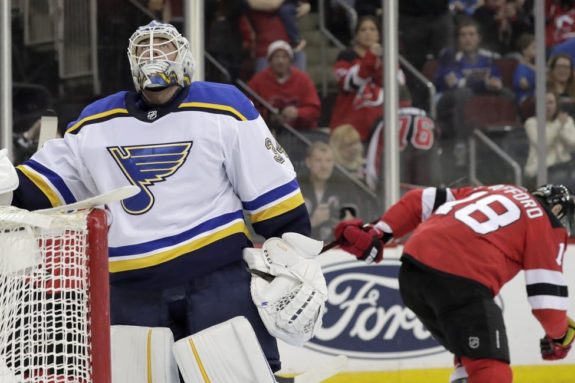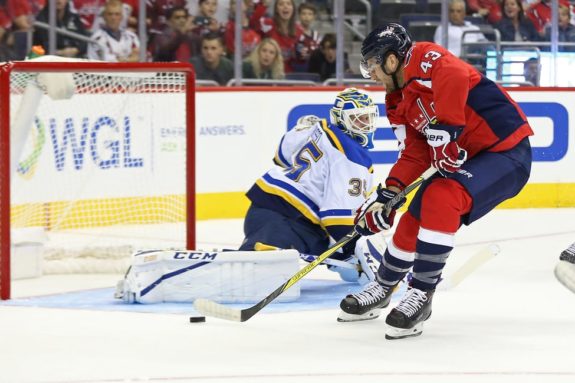Whatever you do, don’t call it a comeback for St. Louis Blues backup goalie Jake Allen.
Allen vs. Binnington
Admittedly, Allen is putting together a stellar campaign. He’s 7-2-2 with a 2.19 goals-against average and .931 save percentage. Those are stats superior to those of No. 1 goalie Jordan Binnington, who just made history as he writes his own personal fairy tale after winning the Stanley Cup in a rookie season during which he was also a Calder Trophy runner-up.

However, if Binnington was the story last year, Allen is the story this one. To a certain degree, even if Binnington had largely been seen as a career minor-leaguer as recently as a single calendar year ago, his recent success can’t come as much of a surprise. That can’t necessarily be said of Allen, who lost the starting job due to his statistical struggles.
By now, everyone knows how the Blues went from last place in early 2019 to winning it all. Allen had started that season as the Blues’ No. 1, making 33 appearances in their first 39 games. While the team as a whole was playing badly, his struggles were front and center. He was 14-13-4, having lost more often that he had won, with an .894 save percentage.
After Binnington took over, Allen played just 13 games the rest of the season. He nevertheless ended 2018-19 with a respectable .905 save percentage, which goes to show just how much better he played down the stretch to prop up his overall numbers. In those 13 remaining appearances, Allen earned a save percentage of .922.
Allen as a Backup Goalie
It would be easy to assume that the Blues as a whole just started playing better in front of their goalies. However, Allen’s winning percentage over those final 13 games was only slightly better than it had been, with a record of 5-4-4, which re-affirms what has become obvious: The Blues made the right choice going with Binnington as their starter.
If you needed further proof, 2018-19 wasn’t just a one-off for Allen. He had been losing his effectiveness over the previous few seasons. His most successful campaign to date was in 2015-16, when he played in 47 games, earning a 26-15-3 record with a .920 save percentage. When the Blues gave him 61 games the following season he went 33-20-5 with a .915 save percentage. In 2017-18, he went 27-25-3 with a .906 save percentage.

So, last season’s performance up until early January, when the Blues rode Allen harder than a horse in an attempt to beat a train? It was just the latest piece of evidence Allen becomes less effective the more he’s played, which is technically true of everyone. It isn’t an issue with pressure either as Allen’s been either hit or miss in the playoffs. So, it appears as though the Blues have landed on that sweet spot, with Allen on pace to play 26 games behind Binnington. As a result, the Blues lead the Western Conference with a 24-8-6 record on the strength of their goaltending as a whole, having won six straight heading into Christmas.
In effect, Allen’s making the most of his new role, taking the for-all-intents-and-purposes demotion in stride. Similar to Robby Fabbri, who was forced to take a back seat and play limited minutes during the Blues’ Stanley Cup run last year, Allen’s been a great team player. Unlike Fabbri, who’s made the most of his opportunities to play a starring role when he’s been given them, Allen just hasn’t been able to, but there’s nothing necessarily wrong with that. Every team needs a good backup to prevent their starters from burning out and Allen has seemingly found his niche as one of the best in the league.
The Importance of Allen
Look to the Toronto Maple Leafs and their goaltending situation as proof. A Stanley Cup contender heading into 2019-20, the Leafs have only been able to earn a single victory with a backup in net this season, putting even their playoff hopes at risk. They may be in second place in the Atlantic Division, but they have two fewer points than each of the two Eastern Conference wild-card teams, who both hail from the Metropolitan. They are just three points up on the ninth-place Florida Panthers, who hold two games in hand.
In any case, with regard to Allen, the only issue is his contract. He’s got a cap hit of $4.35 million both this season and next before he becomes an unrestricted free agent. That’s literally $50,000 less than Binnington.
It isn’t about what they could theoretically get for Allen, because the goaltending market is especially weak. It’s about how they can use the additional cap space and how much faith they have in the likes of prospect Ville Husso, for example. It’s also a matter of affordability. Any given team in the league would kill for the caliber of backup goaltending Allen is providing. Not every team can necessarily fit him under the cap.

In theory, the Blues are doing just that, even if in practice it’s less than ideal from an asset-management perspective as they look to repeat. Worst-case scenario? The Blues continue to ride their goaltending duo as far as Binnington and Allen will take them, all the while showcasing the latter as trade bait.
There are worse things to have than $8.75 million devoted to both of your goalies as long as they’re giving you results… or Allen as an insurance policy. In a pinch, Allen has proven capable of backstopping with the best of them. It’s when he’s relied upon to consistently man the crease that cracks being to show.
So, this season isn’t as much a comeback story for Allen as it the start of the next chapter in his career. It’s confirmation he is in fact an NHL goalie, because there were undeniable doubts in that regard. Obviously, he has the skills. It’s the capacity in which he uses them that has come into question. Asked and answered.